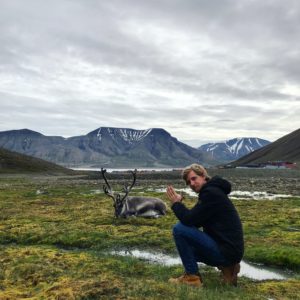The Plant Functional Traits Course 4 (PFTC4) provided multiple opportunities for growth as a plant ecologist. I came to the course with the specific goals of working with Dr. Sean Michaletz from the University of British Columbia, learning to run experiments with Li-Cor instruments, gathering and analyzing data on plant thermoregulation and ecophysiology, and networking with scientists from around the world. I feel I realized these goals and that they were exceeded beyond my expectations. Despite challenges such as finding ice on an arctic island and some malfunctioning equipment, we succeeded in gathering leaf-level gas exchange and photosynthesis data across 50 °C temperature gradients. Dr. Michaletz was an excellent instructor and we were all given the opportunity to learn about the entire process from data capture to analysis. The scientific breadth of attendees at the course encouraged interdisciplinary exchanges that are crucial for breaking into new research ideas.
I left the course with ideas for projects to pursue during the next stage of my research career and a group of colleagues that I am happy to consider friends. I wouldn’t say I learned a great deal about myself—more about others—during the course, but this may be due to the intensive nature of the course itself. Working with this diverse group of people in such a wild environment did highlight some personal attributes. I’m an early bird, I’m intensely inquisitive, I’m at home outside, and I love learning as much as I love teaching. It was a great test of personal adaptability, and I enjoyed feeling so at home in such a foreign environment.
The majority of people in and around Longyearbyen, which was largely tourists, were educated about climate change. People generally agreed that humans were a primary cause of climate change. There was a lot of overlap of the ideas of pollution and climate change, particularly a focus on plastic. I thought it was interesting that the attendees of the trait course generally seemed to disassociate plastic and pollution from climate change when these things are actually completely linked. In general, the majority of people we interacted with on Svalbard seemed more informed about climate change than people in the United States of America.
Surveying people in Svalbard was a fun activity for me, but I know other people were more hesitant. Norwegian colleagues seemed to feel it was a real invasion of privacy to approach strangers and ask them to fill out surveys. I understand this view, but I think the topic of the surveys is interesting and relevant to everyone. In fact, most people were happy to take the surveys, especially upon hearing it was about climate change. We actually had a family of three people who took surveys on their way to their hotel and we had to return to the university before finding them again—considering the surveys lost. However, much later that night while hiking, members of our survey team ran into them fossil hunting outside of town, and to all of our surprise the family had the completed surveys with them. It was great to see that people were truly interested in taking these surveys and participating in this type of study.
